Report on inception meeting, stakeholder interaction program and kickoff meeting in Bangladesh
AQUAFOOD
Climate-resilient aquatic food systems for healthy lives of young women and girls in Bangladesh
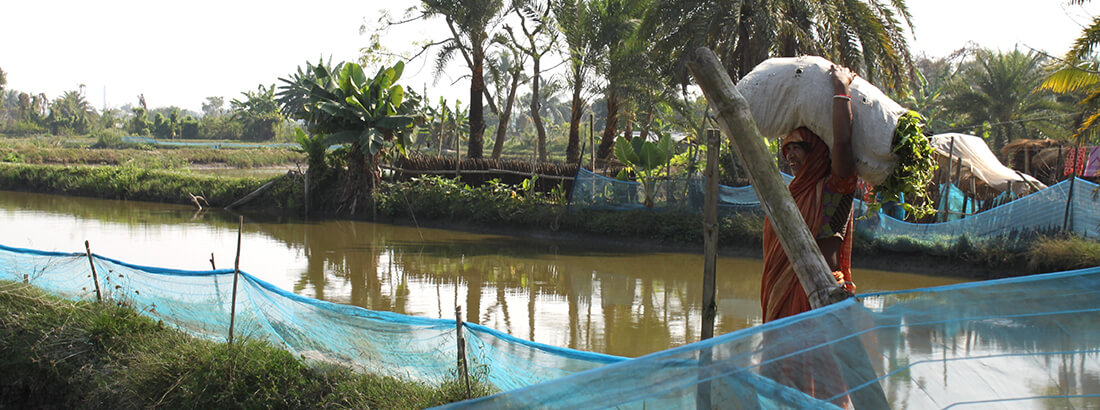
The overall aim of this project is to generate new knowledge about the complex dynamics behind the export-driven aquatic food systems, across the coast-to-inland gradient of Bangladesh, in the context of the high climate change exposure.
- To establish an integrated framework for pathways that a) promote practices, which b) enhance the climate-resilience of c) the complex dynamics behind the export-driven, aquatic food systems of coast-to-inland ecosystems of Bangladesh.
- To investigate the impacts of climate change on the domestic supply’s farm-to-fork supply chains (from export-driven aquatic production systems), to understand their significance for domestic consumption, along with the environmental impact.
- To investigate the links between aquatic foods, and the health, nutrition and welfare of young women in coast-to-inland aquaculture dependent communities.
- To advance the research-based assessment tools of 1) aquatic food consumption using novel tools and biological markers, and 2) aquatic food production and supply chains for domestic consumption, using novel survey designs and mapping tools.
- To establish a stakeholder platform of private and public actors for continued interaction and feedback, along with sourcing of the research results.
- To support research capacity in inter-disciplinary research designs and within relevant scientific fields.
Fish and other aquatic foods are well recognized as an important source of high-quality protein, as well as an important dietary source of micronutrients. In Bangladesh, fish is a fundamental component in diets, consumed frequently - often daily or several times per week in peak seasons of high availability. However, the portions consumed are small and often insufficient to provide adequate amounts of key nutrients. Additionally, high population density and climate change, leading to raising sea level and a changing river hydrology, leave the population vulnerable to food insecurity and malnutrition.
Children and women are particularly vulnerable to nutritional deficiencies due to increased micronutrient requirements relative to energy intake. Adolescents and young women in Bangladesh are particularly at risk due to poverty, tendencies of disfavoring when it comes to food allocation, combined with early marriage and teenage pregnancy. Our previous research in non-married adolescent girls found omega-3 fatty acid status (DHA and EPA in their blood, an indicator for health and aquatic food intake) correlated with an applied measure for degree of female autonomy.
Bangladesh is one of the most vulnerable nations to the impacts of global climate change. The poor living in the coastal aquaculture farming communities is directly at risk of natural disasters; a risk only enhanced by the impacts of climate change. The importance of the export-driven aquaculture in coastal zone and the vulnerability of livelihoods for those living there are particularly crucial given the geography being highly impacted by the consequences of climate change. While Bangladesh has developed climate change specific policies, such as forecasts and preparedness for extreme weather events, climate change still needs to be better integrated and linked into both practical implementation and decisions on local levels across sectors, particularly in the highly exposed coastal communities. In this project, we will contribute new knowledge to fill this gap.
Export-driven aquaculture in context of climate change - an integrated survey
The integrated survey investigating aquatic production systems will integrate multiple methodologies. Overall, a combination of 1) a longitudinal household survey based on multi-level sampling, 2) the application of Geographic Information System (GIS), longitudinal market survey and Life-cycle assessment (LCA) together will form the basis of the investigation. These will provide a novel insight into spatial and temporal dynamics of the aquaculture system’s influence on livelihood, health and nutrition, in context of climate change.
Health and nutrition of young females in context of climate change - cohort study
This research builds on revisiting young women assessed in our previous research in 2017-2018, at that time adolescent girls aged 12-16 years. We hold data from a bi-seasonal survey of 300 adolescent girls, investigating multiple correlations of nutritional status, including aquatic food consumption and female autonomy. We found a positive correlation between blood omega-3 fatty acids as indicator of aquatic intake and a score for self-reported individual autonomy of adolescent girls. This data is a unique opportunity to investigate correlations between perception and adaption to climate change, and associations with health and well-being of the now young women.
Advancing assessment methodology for aquatic food consumption and health
This will cover the advancing of dietary registration of aquatic foods in Bangladesh by the development of a tailored, digitalized tool incorporating the site-specific species diversity. digitalized photo-based assessment tool will be developed. Nutritional composition of aquatic foods will be drawn from a new aquatic food composition database. The research component covers the design and validation. The technical app development will be outsourced to a commercial app developer. The aim is to reach a beta-version and to pilot the tool in cohort study, for further validate in an integrated survey.
Additionally, the following biomarkers will be investigated for the predictive value of aquatic food consumption, on individual or population level, as well as for associations with health and nutrition status. The assessment will be integrated in the study designs of integrated survey and cohort study. Blood fatty acids: Aquatic foods are unique sources of the long-chained omega-3 fatty acids ecosapentaenoic (EPA) and docosahexaenoic acids (DHA), and the blood concentration of EPA and DHA reflects aquatic food intake. Additionally, aquatic foods are also a source of vitamin D, and indicatively associates with fish consumption. In addition to blood markers, exploration of isotopes in hair samples as marker for aquatic food intake will be piloted, and to further explore the use of this technique as a non-invasive indicator of DHA and EPA intakes.
AQUAFOOD is a collaboration between project partners in Denmark, Bangladesh and United Kingdom.
Denmark
Bangladesh
Bangladesh Agriculture University
Noakhali Science and Technology University
United Kingdom
PhD projects
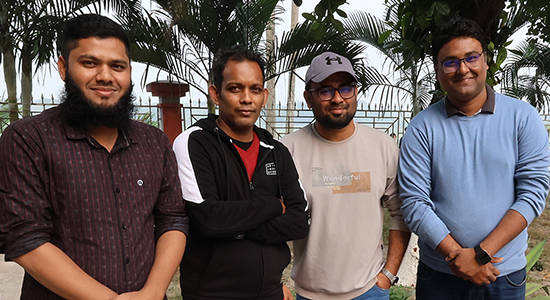
Angkur Mohammad Imteazzaman: Spatio-temporal analysis of aquatic food production and domestic supply
Spatio-temporal analysis of livelihoods and domestic aquatic food supply in export-oriented aquaculture systems in Bangladesh using GIS and RS amid climate change
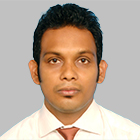 Angkur Mohammad Imteazzaman, MSc in Fisheries, Department of Fisheries, University of Rajshahi, Bangladesh.
Angkur Mohammad Imteazzaman, MSc in Fisheries, Department of Fisheries, University of Rajshahi, Bangladesh.
Mail: angkur.imteaz@gmail.com
Short Biography
I am a fisheries sector development professional with over 13 years of experience in donor-funded research on development initiatives. I hold a Bachelor of Science in Fisheries (Honours) and a Master of Science in Fisheries from the University of Rajshahi, Bangladesh.
My professional journey has included leading impactful projects such as the USAID-funded ECOFISHBD (Phase I & II) and FtF-BAA initiatives. These projects have focused on adaptive co-management, biodiversity conservation, Ecosystem approaches to fisheries managment Marine Spatial Planning, and building climate resilience.
Additionally, I have been involved in developing region-specific aquaculture technologies, promoting disaster risk reduction, and strengthening value chains for small indigenous species. Empowering women and youth to ensure equitable participation and economic opportunities has been central to my work.
Beyond fisheries, I have worked on agroecological interventions, community empowerment, and food securityinitiatives like the UNDP-funded SAS-CEP and the EU-financed ANEP projects. My contributions in these areas have enhanced economic resilience in underserved communities, utilizing my expertise in monitoring, evaluation, and learning, stakeholder collaboration, and technical capacity building to drive impactful, data-driven outcomes.
Skills
- Community driven natural resource management
- Aquatic biodiversity conservation
- Climate adaptive livelihood development
- Stakeholder Collaboration
- Survey, data management and visualization
Supervisor
Dr. Md. Abdus Salam.
Co-Supervisors
Nanna Roos.
Dr. Richard Newton
Social Media Links
Facebook: https://www.facebook.com/share/1FiiPWEAEw/?mibextid=kFxxJD
LinkedIn: http://linkedin.com/in/angkur-m-imteazzaman-5663aa252
Research Gate: https://www.researchgate.net/profile/Angkur-Imteazzaman
Advancing assessment methodology for aquatic food consumption and health in Bangladesh
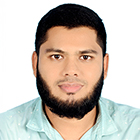 Md Mahbubul Alam Shaun, MS in Nutrition and Food Science with a major in Biochemistry and Food Analysis, Department of Biochemistry and Food Analysis, Patuakhali Science and Technology University (PSTU), Bangladesh.
Md Mahbubul Alam Shaun, MS in Nutrition and Food Science with a major in Biochemistry and Food Analysis, Department of Biochemistry and Food Analysis, Patuakhali Science and Technology University (PSTU), Bangladesh.
Mail: shaunpstu54@gmail.com
Short Biography
I completed my undergraduate and postgraduate studies in Nutrition and Food Science at Patuakhali Science and Technology University (PSTU), Bangladesh. These academic foundations provided me with a comprehensive understanding of human nutrition, food systems, nutrition security, and their intersections with public health.
Following my academic achievements, I worked extensively in the development sector, focusing on public health nutrition. My career includes impactful roles addressing nutritional challenges in vulnerable populations. Notably, I was involved in the mainstream nutritional projects as well as the Rohingya response funded by international donors including the FCDO and the UNHCR, contributing to humanitarian efforts aimed at improving nutritional outcomes for vulnerable communities. These experiences equipped me with practical insights into managing large-scale nutritional interventions in complex settings.
In my current role as a PhD fellow in Fisheries and Marine Science in Noakhali Science and Technology University (NSTU), I am broadening my expertise by integrating nutrition with fisheries and marine sciences. My research under the AQUAFOOD Project focuses on sustainable aquaculture practices, aiming to address global challenges related to nutrition security, environmental sustainability, and livelihoods. Through interdisciplinary approaches, I seek to contribute to the development of innovative solutions that enhance the quality and availability of aquatic food resources.
Beyond my academic and professional pursuits, I am passionate about fostering collaboration between academia and the development sector to create meaningful and sustainable impacts. He envisions a future where scientific research directly informs policies and practices to address malnutrition and promote sustainable food systems, particularly in developing countries like Bangladesh.
My diverse background in nutrition, public health, and fisheries underscores my commitment to bridging gaps between science, policy, and practice for a healthier and more sustainable world.
Skills
Nutrition Security, Human Nutrition, Maternal and Child Nutrition, Food System, Sustainable Nutrition, and Public Health Nutrition.
PhD Supervisor
Dr. Abdullah-Al Mamun, Professor, Department of Fisheries and Marine Science, Noakhali Science and Technology University, Bangladesh.
Co-supervisor
Dr. Baukje de Roos, Professor, The Rowett Institute, University of Aberdeen, UK.
Md Ruhul Kabir, Assisstant Professor, Department of Food Technology and Nutrition Science (FTNS), Noakhali Science and Technology University, Bangladesh.
Social Media Accounts
Google Scholar: https://scholar.google.com/citations?user=YcA102cAAAAJ&hl=en
ResearchGate: https://www.researchgate.net/profile/Md-Mahbubul-Alam-Shaun
ORCID: https://orcid.org/my-orcid?orcid=0000-0002-1909-8509
LinkedIn: https://www.linkedin.com/in/md-mahbubul-alam-shaun-b5666a176/
Health and nutrition of young females in context of climate change in Bangladesh
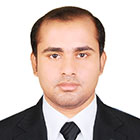 Md. Mahmudul Hasan, M.Sc. in Fisheries Technology, Faculty of Fisheries, Patuakhali Science and Technology University, Bangladesh.
Md. Mahmudul Hasan, M.Sc. in Fisheries Technology, Faculty of Fisheries, Patuakhali Science and Technology University, Bangladesh.
Mail: mhjoy33@gmail.com
Short Biography
I am Md. Mahmudul Hasan, an accomplished young fisheries researcher from Bangladesh. I hold an M.Sc. in Fisheries Technology (2019) and a B.Sc. in Fisheries (2017) degree with remarkable academic results. My research primarily focuses on nutrition of fishes and its contamination, marine fish value chain, occupational safety, and fishery product-based nutritional interventions for coastal women and children.
Over the years, I have had the opportunity to contribute to several prestigious research projects. As a Research Associate in the “Quality Dried Fish and Fish Powder for Nutritional and Livelihood Improvement of Pregnant, Lactating Women and Infants in Coastal Area of Bangladesh”, I developed nutrient-enriched fish products to improve the health of coastal women communities.
My involvement in the “fishSAFE 2025” project, funded by Lloyd’s Register Foundation, allowed me to conduct safety training and promotional events to improve occupational safety for small-scale fishers in Bangladesh. Additionally, as a research assistant, I was involved in the International Foundation for Science-funded project where I assessed nutritional status and contamination risks in marine freshwater fish and dried fish and promoted improved drying technologies to benefit coastal communities.
My scholarly contributions include publications in reputed journals such as Marine Pollution Bulletin, Marine Policy and Environmental Science and Pollution Research, where I focused on marine fish nutrition and contamination, public health risks, value chains, and sustainable fishing practices. I am honored to get the opportunity to present my research at national and global platforms, including at IFISH6 conferences at the FAO headquarters in Rome, Italy.
In addition to the above, I have experience in microbial and nutritional studies, as well as socio-economic research focused on coastal communities’ livelihood improvement. My work is driven by a strong commitment to enhancing fisheries sustainability and improving the welfare of coastal communities. By bridging academic research with practical applications, I aim to make a meaningful contribution to the well-being of vulnerable coastal communities in Bangladesh.
Skills and research area
Marine fish nutrition and contamination, marine fish value chain, occupational safety, and fishery product-based nutritional interventions for coastal women and children.
PhD Supervisor
Professor Abdullah-Al Mamun, PhD.
Co-supervisor
Nanna Roos
Dr. Md. Ruhul Kabir
Social Media
Researchgate Account Name: Md. Mahmudul Hasan
Account Link: https://www.researchgate.net/profile/Md-Hasan-199
Linkedin Account Name: Md. Mahmudul Hasan
Account Link: www.linkedin.com/in/md-mahmudul-hasan-328833233
Facebook Account Name: M Hasan Joy
Account Link: https://www.facebook.com/mh.joy.7549
Assessing environmental consequences of climate change using Life cycle Assessment (LCA) of aquatic food production and consumption, with a focus on livelihoods, nutrition and health of the people living in coastal areas in Bangladesh
 Sudip Bhattacharya: MSc. In Fisheries Technology from Department of Fisheries, Bangladesh Agricultural University, Mymensingh, Bangladesh.
Sudip Bhattacharya: MSc. In Fisheries Technology from Department of Fisheries, Bangladesh Agricultural University, Mymensingh, Bangladesh.
Mail: sudip.bau20@gmail.com
Short biography
I am a committed fisheries and aquaculture professional with a strong focus on sustainable resource management, community development, and innovative aquaculture solutions. My academic foundation includes a Bachelor of Science in Fisheries (Honours) and a Master of Science in Fisheries Technology from Bangladesh Agricultural University.
I began my career in 2014 as an Upazila (Sub District) Fisheries Officer under the Bangladesh Civil Service and was promoted to Senior Upazila Fisheries Officer in 2019. Over the years, I have taken on multifaceted roles to address the pressing challenges in the fisheries sector. My work primarily involves enforcing conservation laws, supervising compensation schemes for fishers, and leading awareness campaigns for sustainable practices.
I work closely with fish farmers to introduce climate-resilient aquaculture practices, promote the adoption of innovative technologies, and ensure equitable access to essential resources such as inputs and training opportunities and also strengthened the socio-economic resilience of marginalized fishers.
Collaboration has been a cornerstone of my work. These partnerships have enabled me to address diverse challenges, from mitigating climate impacts on aquatic ecosystems to strengthening value chains for fish and aquaculture products.
Driven by a vision for equitable and sustainable fisheries development, I continue to explore innovative solutions that align with the needs of local communities and the broader goals of environmental stewardship. My passion for bridging technical expertise with real-world impact motivates me to contribute to a more resilient and inclusive aquaculture sector in Bangladesh.
PhD supervisor
Dr. Mohammad Mahfujul Haque.
Co-Supervisor
Dr. Richard Newton.
Nanna Roos.
Social media
Linkdin: https://www.linkedin.com/in/sudip-bhattacharya-875095340
Facebook: https://www.facebook.com/sudip.bhattacharya.507
Whatsapp: +880-1726444011
Involved in the project
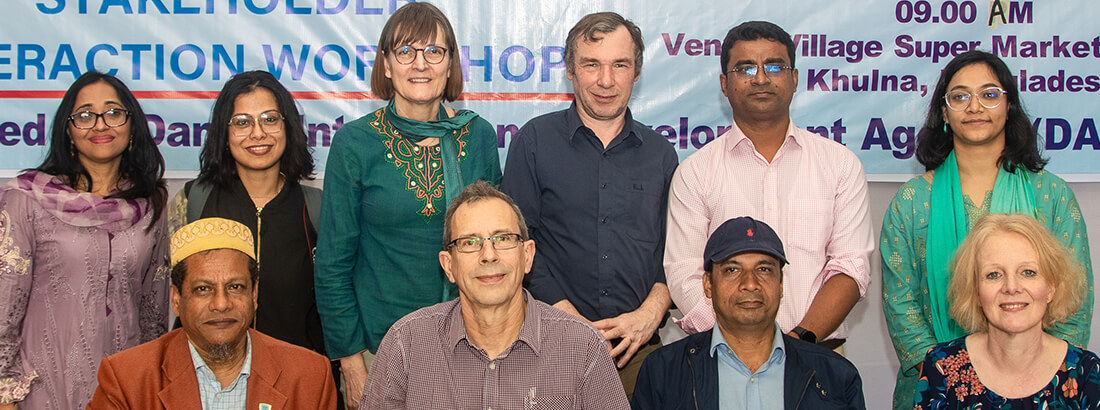
Back row from left to right: Gulshan Ara, Navodita Malla, Nanna Roos, Richard Newton, Abdullah-Al Mamun, Samira D. Ali.
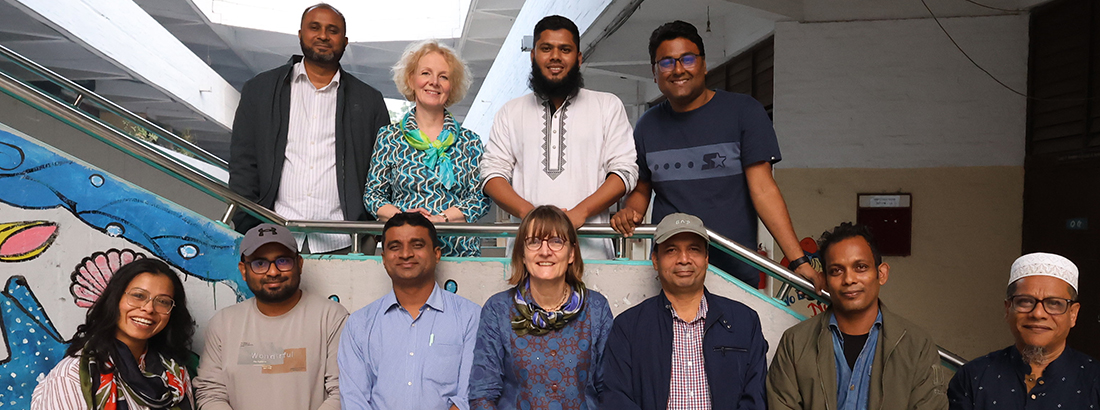
Project partners gathered at BAU January 2025.
Back row from left to right: Md Ruhul Kabir, Baukje de Roos, Md Mahbubul Alam Shaun, Sudip Bhattacharya.
Front row from left to right: Navodita Malla, Md Mahmudul Hasan, Abdullah-Al Mamun, Nanna Roos, Mohammad Mahfujul Haque, Angkur Md Imteazzaman, M.A. Salam.
Internal
| Name | Title | Phone | |
|---|---|---|---|
| Bikila Soboka Megersa | Postdoc | ||
| Nanna Roos | Associate Professor | +4535332497 | |
| Navodita Malla | Postdoc | +4535326525 |
External
Dr. Mohammad Mahfujul Haque, Professor, Department of Aquaculture, Bangladesh Agricultural University
Dr. Md. Abdus Salam, Professor, Department of Aquaculture, Bangladesh Agricultural University
Dr. Abdullah-Al Mamun, Professor, Department of Fisheries and Marine Science, Noakhali Science and Technology University
Dr. Tahmeed Ahmed, Executive Director, ICDDR,B
Dr. David C. Little, Professor, Aquatic Resource Development, University of Stirling
Dr. Richard Newton, Lecturer in Resilient Food Systems, Institute of Aquaculture, University of Stirling
Dr. Baukje de Roos, Professor, The Rowett Institute, University of Aberdeen
Funded by
 Ministry of Foreign Affairs of Denmark (MFA), administered by Danida Fellowship Centre.
Ministry of Foreign Affairs of Denmark (MFA), administered by Danida Fellowship Centre.
Period: 1 October 2023 - 31 March 2028 (54 months)
